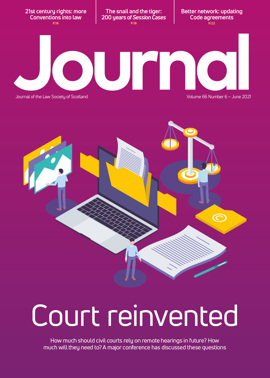Fairness and justice: nice and simple does IT
The impact of COVID has meant vulnerable people struggling to access justice when they have needed it most. Demand for legal services from some of the most vulnerable has grown over the past year. But victims of domestic abuse, families on low incomes or benefits, and older people have struggled to access the justice system due to restrictions and the move to online legal services.
Recent figures show that domestic abuse has risen by 10% over the past year; however victims find it even more challenging to access the justice system adequately. And vulnerable clients have struggled to adapt to new technological demands from legal services, courts and tribunals.
Using lockdown to tackle the challenges head on, Dundee Law Centre revamped its online presence and back office tools to match our ambitions. Investing in technologies was obvious. Just as other industries have been disrupted by digitisation and smart technology, our business model, as a community not-for-profit law firm, suggested that pressures on legal process management would mean technology having a large effect on sustainable legal practices. So, we created the right mix of human and technology capabilities to redefine our relationships to benefit our clients. This illustrated just how important it is to find new ways of connecting with our clients and people in need, ensuring no one is denied access to justice.
Technology is not enough
Access to justice is the ability of people to gain an effective remedy (sometimes through the courts) to protect their rights. Technological developments can assist. However, this can be taken further by using technology to simplify complex legal information. The use of mobile apps and chatboxes to provide information, triage and signpost people increases information on their legal rights and options. The use of online courts and hearings has the potential to reduce costs, increase access to courts and tribunals, and ensure that people can access appropriate remedies easily.
However, I have reason to question whether the use of technology will really increase access to justice. Those who are most at risk of being unable to access justice (the poor and vulnerable) are less likely to be digitally literate. In Scotland, 34% of applicants for universal credit looked for help from the Citizens Advice Bureau because they could not access the internet. This illustrates the significant risk of digital exclusion. While technology is likely to increase access to justice for those who are digitally literate, it can leave others out.
Ninety per cent of adults have recently used the internet; but that does not mean they are digitally competent to participate in online hearings, courts or negotiations. Moreover, access to the internet does not mean regular or easy access. Digital skills, internet quality, financial resources are all necessary to engage fully in the digital legal system.
Even with digital competence, people cannot effectively solve their legal problems without legal expertise. Technology can be harnessed to provide people with all the information that they need; it cannot give them the legal expertise to apply the information effectively. The lay person is challenged to understand legal information without expert help. Technology must be supported by face-to-face legal guidance and legal advice. Without this, the use of technology to further access to justice will have the unintended consequence of further decreasing access.
Keep it simple
Technology and apps are additional tools, enabling resourceful use of solicitor time. COVID-19 has been challenging; but it has given us the opportunity to invest in our systems, enhance our delivery and outreach models, and learn how clients use technology. We have become more agile by moving to cloud-based CRM (customer relationship management) and softphone technology. As Joyce Horsman, principal solicitor, outlines, “We piloted guided sessions in partnership with other organisations throughout the city. In essence, a support worker helps the individual to navigate the technology. However, sessions are limited, and engagement is challenging.”
We are looking forward to welcoming people to face-to-face meetings and continuing to provide quality legal advice and support when and where it is most needed. But by adapting we can deliver more legal services to vulnerable people, who now can reach us by phone, text, webchat, WhatsApp and Facebook. Simple apps, easy-to-use technology delivering for those with complex needs – and we should never forget how a telephone conversation can help to resolve many a legal enquiry.
Perspectives
Features
Briefings
- Criminal court: Doing justice with benefit fraud
- Corporate: Clarity is king – win some, lose some
- Agriculture: TFC provides holdings compliance guide
- Employment: Unintentional wrongs and injured feelings
- Sport: Where now for worker status?
- Intellectual property: IP and artificial intelligence
- Property: EWS1: another hurdle for the lawyer
- Scottish Solicitors' Discipline Tribunal
In practice
- Society's new office bearers step up
- AGM hears of a challenge met
- How do you manage the bank manager?
- Letters of engagement: one size does not fit all
- Climate change, inequality and the profession
- Fairness and justice: nice and simple does IT
- Profile: Craig Connal
- The Eternal Optimist: Difficult, or just different?
- Ask Ash: An anxious return






